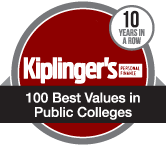College Catalog: 2015-2016
School of Theoretical and Applied Science (TAS): Integrated Science Studies (B.S.)
Website: School of Theoretical and Applied Science
The Integrated Science Studies major is designed to meet a growing professional and cultural need for people whose knowledge of science is directed to its use, expression, and administration in both the private and public sectors. Students in the major are expected not only to achieve specific competencies in the sciences but also critical understandings of the roles of the sciences in social, political, and economic contexts.
Emphasis in the major is placed on the breadth and depth of the foundational science curriculum. Students acquire detailed knowledge of the sciences and mathematics by engaged study in a range of courses, most of which are laboratory courses—from chemistry, physics, and biology to geology, ecology, and environmental science. The foundational courses have been selected to establish a broad base for study, while allowing flexibility and opportunities to pursue more specific interests at the upper levels. At the upper level, students take five courses in their elected concentration: Science, Technology and Society; Science Journalism, Business Administration, or Public Policy/Administration. The major is completed with a capstone course on science writing, which allows the student to complete the integration of the foundational sciences with each other and with the concentration courses.
Students are encouraged to undertake internships, co-ops, and research projects (for example, by independent study or through the TAS Research Honors Program.
Students who complete the major will be competently prepared to pursue further academic work in graduate and professional schools in science, business, and other areas, as well as to begin careers in their chosen fields.
The School of Theoretical and Applied Science offers the major leading to a B.S. degree in Integrated Science Studies – (chosen concentration).
Goal 1: Graduates should be able to demonstrate an understanding and knowledge of specific scientific principles and processes and the conceptual structure which integrates the all scientific inquiry and enterprises.
Outcome 1: Demonstrate specific knowledge of chemistry, physics, biology, environmental science, and the earth sciences and of their common principles of understanding [all foundational science courses].
Outcome 2: Conduct scientific investigations by conducting experiments, forming testable propositions, evaluating evidence and data, drawing logically relevant inferences, and establishing empirical conclusions.
Goal 2: Graduates should be able to evaluate the integrity and authority of scientific information by assessing its originating source and the methods used to generate it.
Outcome 1: Conduct scientific investigations by conducting experiments, forming testable propositions, evaluating evidence and data, drawing logically relevant inferences, and establishing empirical conclusions.
Outcome 2: Design and construct a program of inquiry and research, assess data and evidence, and write an original proposal – a public policy recommendation, a business report, an article for a newspaper or periodical, a grant proposal, or any other expression of such a program in which science and mathematics are integrated into civic and private discourse.
Goal 3: Identify the underlying and public scientific issues which under-gird critical policy decisions in both the public and private sectors.
Outcome 1: Design and construct a program of inquiry and research, assess data and evidence, and write an original proposal – a public policy recommendation, a business report, an article for a newspaper or periodical, a grant proposal, or any other expression of such a program in which science and mathematics are integrated into civic and private discourse.
Outcome 2: Within the concentrations, graduates will be able to: a. communicate clearly and comprehensibly about those scientific issues which are critical to public understanding (science journalism concentration); b. set forth that scientific knowledge which directs public policy decisions and is integrated into both public and private administration of scientific and technological enterprises (public policy/administration concentration); c. rely upon a fundamental understanding of science and scientific research in carrying out business initiatives and enterprises, in sales, in management, and in assessment (business administration concentration); d. articulate the importance of and impacts of science on society and the role of society in scientific research and teaching (science, technology and society concentration).
Goal 4: Graduates should be able to communicate clearly scientific and mathematical ideas and innovations not only to scientists, but to other professionals and the public at large through oral presentations or by the visual and written media.
Outcome 1: Communicate scientific knowledge and understanding clearly, succinctly, precisely, and effectively in oral and written forms.
- Transfer students who have 48 or more credits accepted at the time of transfer are waived from the courses marked with a (W) below. Waivers only apply to General Education Requirements NOT School Core or Major Requirements.
- Double counting between General Education, School Core, and Major may be possible. Check with your advisor to see if any apply.
- Writing Intensive Requirement (six courses): three writing intensive courses in the general education curriculum are required: First Year Seminar, Critical Reading and Writing, and Readings in the Humanities; the other three courses are taken in the major.
- Students in the Science, Technology and Society concentration cannot enroll in the Science, Technology and Science minor
- Not all courses are offered each semester. Please check the current Schedule of Classes for semester course offerings.
INTEGRATED SCIENCE STUDIES MAJOR
- Subject & Course # – Title & Course Description
- GENERAL EDUCATION REQUIREMENTS
- INTD 101 - FIRST YEAR SEMINAR (W)
- SELECT ONE – (W) BADM 115 - PERSPECTIVES OF BUSINESS AND SOCIETY OR
- (W) SOSC 101 - SOCIAL ISSUES
- CRWT 102 - CRITICAL READING AND WRITING II
- AIID 201 - READINGS IN THE HUMANITIES (W)
- SELECT ONE – (W) GE-HISTORY CATEGORY: HIST 101-110
- SELECT ONE – GE MATH: MATH 108 OR MATH 121
- SELECT ONE – GE-INTERCULTURAL NORTH AMERICA CATEGORY
- SELECT ONE – GE-INTERNATIONAL ISSUES CATEGORY
- SELECT ONE – (W) GE-TOPICS ARTS AND HUMANITIES CATEGORY OR
- (W) GE-TOPICS SOCIAL SCIENCE CATEGORY
- SCHOOL OF THEORETICAL AND APPLIED SCIENCE REQUIREMENT
- TAS School Core is fulfilled within the major : SCIN 396 History of Scientific Thought and Math requirement
- INTEGRATED SCIENCE STUDIES MAJOR REQUIREMENTS
- BIOL 110 - FUNDAMENTALS OF BIOLOGY I: LECTURE AND LAB
- BIOL 112 - FUNDAMENTALS OF BIOLOGY II
- BIOL 221 - GENERAL ECOLOGY OR
- ENSC 210 - THEORETICAL AND FIELD ECOLOGY LEC/LAB
- CHEM 110 - FUNDAMENTALS OF CHEMISTRY I: LECTURE AND LAB
- CHEM 112 - FUNDAMENTALS OF CHEMISTRY II: LECTURE AND LAB
- ENSC 103 - INTRODUCTION TO ENVIRONMENTAL SCIENCE
- GEOL 105 - FUNDAMENTALS OF GEOLOGY: LEC/LAB
- PHYS 110 - FUNDAMENTALS OF PHYSICS I: LECTURE AND LAB
- PHYS 112 - FUNDAMENTALS OF PHYSICS II: LECTURE AND LAB
- PHYS 103 - INTRODUCTION TO ASTRONOMY
- SCIN 396 - HISTORY OF SCIENTIFIC THOUGHT
- SCIN 435 - WRITING ABOUT SCIENCE FOR PUBLIC MEDIA
- MATHEMATICS REQUIREMENT: SELECT ONE
- ENSC 345 - RESEARCH DESIGN & STATISTICS
- MATH 121 - CALCULUS I
- MATH 122 - CALCULUS II
- PSYC 242 - STATISTICS
- UPPER LEVEL CONCENTRATION: SELECT ONE
- SCIENCE, TECHNOLOGY AND SOCIETY
- REQUIRED COURSE:
- SCIN 210 - SCIENCE, TECHNOLOGY, AND SOCIETY
- SELECT FOUR COURSES: (select one from each Category. The fourth course can be from any category)
- CATEGORY 1: SCIENCE AND SOCIETY
- ENSC 305 - CLIMATE CHANGE SCIENCE (formerly ENSC-405)
- ENST 215 - ENVIRONMENTAL HISTORY
- ENST 317 - ENVIRONMENTAL POLICY AND REGULATION
- GEOG 303 - WATER RESOURCES
- SCIN 434 - WOMEN AND SCIENCE
- CATEGORY 2: TECHNOLOGY AND SOCIETY
- AMER 307 - TECHNOLOGY AND CULTURE IN AMERICA
- ENST 223 - ENERGY AND SOCIETY
- ENST 313 - APPROPRIATE TECHNOLOGY
- ENST 314 - GEOGRAPHICAL INFORMATION SYSTEMS
- MUSI 316 - MUSIC, TECHNOLOGY AND MEDIA
- SCIN 230 - COMPUTERS AND SOCIETY
- CATEGORY 3: ETHICS/LAW
- ENST 326 - ENVIRONMENTAL LAW
- PHIL 328 - BIOETHICS
- PHIL 322 - PHILOSOPHY OF SCIENCE
- PHIL 333 - ETHICS
- SCIENCE JOURNALISM
- COMM 208 - NEWSWRITING * (*Pre-requisite of GEOL 105 for INSS students)
- COMM 304 - WRITING FOR PUBLICATION
- COMM 307 - ENVIRONMENTAL WRITING
- COMM 311 - COMMUNITY JOURNALISM
- COMM 324 - REPORTING AND PRODUCING ONLINE NEWS
- BUSINESS ADMINISTRATION
- ACCT 221 - PRINCIPLES OF FINANCIAL ACCOUNTING
- BADM 223 - BUSINESS LAW I
- ECON 101 - MICROECONOMICS OR
- ECON 102 - INTRODUCTION TO MACROECONOMICS
- MGMT 302 - MANAGING ORGANIZATIONAL BEHAVIOR
- MKTG 290 - MARKETING PRINCIPLES AND PRACTICES
- *A student may opt to complete the Business Essentials Certificate by completing its Personal Development Seminars
- PUBLIC POLICY/ADMINISTRATION
- ENST 207 - PUBLIC POLICY
- POLI 223 - AMERICAN GOVERNMENT
- POLI 318 - POLITICS OF STATE AND LOCAL GOVERNMENT
- METHODS: SELECT ONE
- PSYC 242 - STATISTICS
- SOCI 308 - SOCIAL STATISTICS WITH COMPUTERS
- POLI 316 - POLITICAL SCIENCE METHODOLOGY
- ELECTIVES: SELECT ONE
- BADM 223 - BUSINESS LAW I
- ENST 317 - ENVIRONMENTAL POLICY AND REGULATION
- ENST 326 - ENVIRONMENTAL LAW
- INTL 250 - CONTEMPORARY INTERNATIONAL HUMAN RIGHTS
- INTL 337 - HUMAN RIGHTS IN LATIN AMERICA
- POLI 308 - CONTEMPORARY PROBLEMS IN AMERICAN POLITICS
- POLI 312 - UNITED NATIONS: WORLD POLITICS
- POLI 328 - LAW AND POLITICS OF THE INTERNATIONAL ENVIRONMENT
Note: A 2.0 GPA in the major is required for graduation.
General Education Requirements
Four Year Plan
Graduation Requirements
School of Theoretical and Applied Science Website
Faculty Profiles






